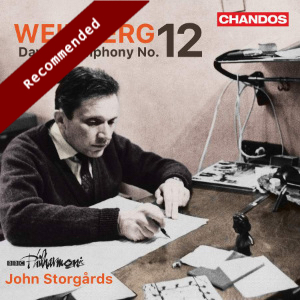
Mieczysław Weinberg (1919–1996)
Dawn, Op. 60 (1957)
Symphony No. 12, Op. 114 “In memoriam Dmitri Shostakovich” (1976)
BBC Philharmonic/John Storgårds
rec. 2022, MediaCityUK, Salford, Manchester, UK
Chandos CHAN20165 [74]
“A good composer borrows”, Igor Stravinsky reportedly once said, “but a great composer steals.” Where does that leave Mieczysław Weinberg, who neither exactly borrowed, nor stole? It is almost impossible to think of him without Dmitri Shostakovich, but as this stunning new Chandos disc demonstrates, the flow of influence between the two composers went back and forth. Both composers were locked into each other’s aesthetic orbit like a binary star system. What appears to be so derivative of Shostakovich in Weinberg at first hearing, often reveals upon closer study to be anticipatory; a peculiar quality I noted in my dismissive review of Pieter Wispelwey’s recording of the latter’s Cello Concerto.
This album’s opening work, Dawn, a symphonic poem composed in 1957 for the 40th anniversary of the October Revolution, is a typical Weinbergian amalgam of material influential and influenced. Consider the dotted march for muted trumpets that sputters about in the middle of the work, which seems to have been practically lifted from the finale of Shostakovich’s contemporaneous Eleventh Symphony. Yet, a decade later, the elder composer surely had Dawn and particularly its ruminative opening for low strings in octaves in mind when he composed October, his own commemorative work for the same historical event. Whereas in that work, Shostakovich relaxed his late idiom into something more outwardly attractive, Weinberg’s Dawn is of a piece with his serious music. Notwithstanding its bright C-major coda, which breaks through the clouds at the last minute, the pervading mood of this compelling work is anything but celebratory, much less populist.
Ironically, it is in Weinberg’s Twelfth Symphony from 1976, a musical valedictory to Shostakovich, that his individual traits assert themselves most markedly. A work less memorial to an individual than it is an epic lament for the passing of an entire epoch, it begins with a stark, three-note motif embroidered by a Baroque-like melismatic flourish, which leads into a discursive symphonic narrative. Unfolding over twenty minutes, this first movement is almost a symphony unto itself. Scherzo and slow movement follow, their moods and textures by turns astringent and austere; the symphony concludes with an enigmatic and delicately scored finale that is one of Weinberg’s finest creations.
Is this bereavement only for the life that Weinberg eulogizes within the symphony’s pages, or for something more? As Georgy Sviridov, Weinberg’s friend and colleague, observed with not unjust bitterness in his memoirs, Shostakovich’s star burned so bright, was so central in the Soviet firmament, that it made it difficult for younger composers to find their place within it. After enduring the Stalin years (although as Alexander Belonenko’s research has shown, even these were not without significant professional advantages beyond the reach of other composers), the institutions of Soviet music in Shostakovich’s later years were to a great extent at his service, forming even a kind of cult of personality that made no contingencies for when the subject of veneration inevitably would be no more. It is tempting, then, to hear Weinberg’s symphony as an adumbration of the dwindling into irrelevance and collapse of Soviet music’s institutions, forecasting the eventual end of the Soviet state itself.
In this symphony, albeit occasionally obscured as if by a veil of ashes, Weinberg’s most striking features are heard: its essential and unremitting tragedy, the favoring of focus over contrast, anxious rhythms, and wiry lyricism that departs sharply from Shostakovich’s preference for terse motives. Unsurprisingly for a composer who experienced some of the worst of the 20th century first-hand, Weinberg’s musical sorrow is felt as flesh of his flesh. At times, one senses that he struggled with the autobiographical artist’s need to aestheticize and distil life into creative work, so acute does his concern with expressive immediacy appear to be. In his Twelfth Symphony, he triumphs over these challenges, producing a score that is vital, distinctive, and superbly crafted.
If not quite matching the electricity of Maxim Shostakovich or Vladimir Fedoseyev’s recordings with the Moscow Radio Symphony Orchestra—the former once available on CD from Olympia (OCD 472) and Russian Disc (RDCD 11 010); the latter has never been reissued—the sumptuousness, detail, color, and presence of this Chandos recording are unparalleled in this symphony’s discography. Perhaps no other recording makes a better case that this symphony is not only one of Weinberg’s most successful works, but that it is also undoubtedly one of the major achievements of Soviet music in the 1970s.
John Storgårds writes in his brief afterword to David Fanning’s excellent liner notes that this recording with the BBC Philharmonic was intended “almost as a coda” to their survey of the late Shostakovich symphonies. “Almost”—is more in the offing? One sure hopes so. Not for just more Weinberg, but how about the later symphonies of Gavriil Popov, Boris Tchaikovsky, and Boris Parsadanian; or Sviridov’s Wooden Russia, It is Snowing, his suites from Time, Forward! and The Snowstorm; or the other two great Shostakovich musical memorials, Tigran Mansurian’s In Memory of Dmitri Shostakovich and Boris Tishchenko’s Symphony No. 5? As this dazzling recording by Storgårds and the BBC Philharmonic unequivocally proves, the riches of Soviet music, still so little appreciated in the West, extends far beyond Shostakovich.
Néstor Castiglione
Help us financially by purchasing from




















